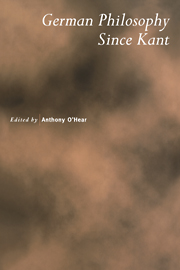Book contents
- Frontmatter
- Contents
- Preface
- Notes on Contributors
- Fichte and Schelling
- Hegel's Critique of Foundationalism in the ‘Doctrine of Essence’
- Schopenhauer's Pessimism
- Karl Marx
- Nietzsche's Virtues: A Personal Inquiry
- Bolzano, Brentano and Meinong: Three Austrian Realists
- Vorsprung durch Logik: The German Analytic Tradition
- German Philosophy of Mathematics from Gauss to Hilbert
- The Revolution of Moore and Russell: A Very British Coup?
- Husserl's Concept of Being: From Phenomenology to Metaphysics
- Frege and the Later Wittgenstein
- Otto Neurath, the Vienna Circle and the Austrian Tradition
- Does the Nothing Noth?
- Reactionary Modernism
- Adorno on Disenchantment: The Scepticism of Enlightened Reason
- Habermas, Science and Modernity
- German Philosophy Today: Between Idealism, Romanticism, and Pragmatism
- The Career of Aesthetics in German Thinking
- Hermeneutic and Analytic Philosophy. Two Complementary Versions of the Linguistic Turn?
- Index of Names
Vorsprung durch Logik: The German Analytic Tradition
Published online by Cambridge University Press: 29 September 2009
- Frontmatter
- Contents
- Preface
- Notes on Contributors
- Fichte and Schelling
- Hegel's Critique of Foundationalism in the ‘Doctrine of Essence’
- Schopenhauer's Pessimism
- Karl Marx
- Nietzsche's Virtues: A Personal Inquiry
- Bolzano, Brentano and Meinong: Three Austrian Realists
- Vorsprung durch Logik: The German Analytic Tradition
- German Philosophy of Mathematics from Gauss to Hilbert
- The Revolution of Moore and Russell: A Very British Coup?
- Husserl's Concept of Being: From Phenomenology to Metaphysics
- Frege and the Later Wittgenstein
- Otto Neurath, the Vienna Circle and the Austrian Tradition
- Does the Nothing Noth?
- Reactionary Modernism
- Adorno on Disenchantment: The Scepticism of Enlightened Reason
- Habermas, Science and Modernity
- German Philosophy Today: Between Idealism, Romanticism, and Pragmatism
- The Career of Aesthetics in German Thinking
- Hermeneutic and Analytic Philosophy. Two Complementary Versions of the Linguistic Turn?
- Index of Names
Summary
Introduction: analytic Germans and surprisingly analytic Germans
Although at present analytic philosophy is practiced mainly in the English-speaking world, it is to a considerable part the invention of German speakers. Its emergence owes much to Russell, Moore, and American Pragmatism, but even more to Frege, Wittgenstein, and the logical positivists of the Vienna Circle. No one would think of analytic philosophy as a specifically Anglophone phenomenon, if the Nazis had not driven many of its pioneers out of central Europe.
So there are analytic Germans. It is nevertheless controversial to speak of a German analytic tradition. For it may seem that Frege, Wittgenstein, and the Vienna Circle stand radically apart from the mainstream of Germanophone philosophy. (Wedberg 1984, chapter I; Coffa 1991, 1–4). In so far as they belong to a tradition at all, the story goes, it is that of anglophone analytic philosophy, which received either these thinkers or at least their ideas with open arms. The German and Austrian origins of Frege, Wittgenstein, and the Vienna Circle are, it appears, merely an unfortunate coincidence, just like the origins of Händel, Freud, Einstein, the House of Windsor, or the christmas tree.
In this paper I want to undermine this image and to make out a tentative case for the existence of a German analytic tradition.
- Type
- Chapter
- Information
- German Philosophy since Kant , pp. 137 - 166Publisher: Cambridge University PressPrint publication year: 1999
- 1
- Cited by

